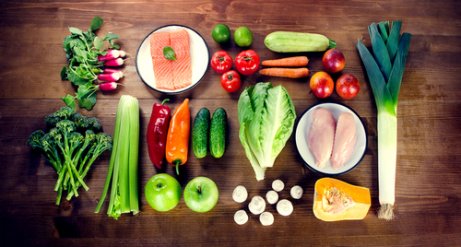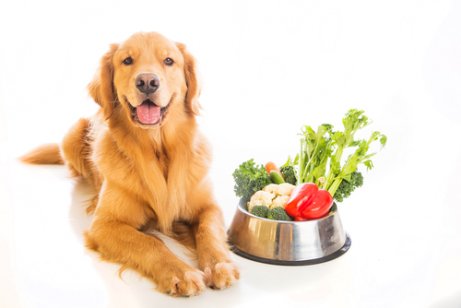Vegetables your dog can and can't eat

Dogs can eat some kinds of “human food.” However, it’s best for them to eat dog food because it provides everything their bodies need. Sometimes you can even treat your dog to some variety with different shapes, textures, colors, and tastes in their food. However, you need to know what vegetables your dog is able to eat.
Vegetables dogs can and can’t eat
The BARF diet consists of giving your pet raw food, such as homegrown food, meat, fish, and fruit. Most of these ingredients must be cooked first.
This diet is good for all animals because they would eat a similar diet in their natural habitat. Even though you can give a variety of fruits and vegetables to your dog, there are some that can’t be eaten for several reasons.
The living and eating healthy is becoming very popular, even when it comes to pet nutrition. That’s why you need to remember that animals have different stomachs and digestive systems than humans and not everything we eat is good for them.

Continue reading to find out what vegetables dogs can and can’t eat.
Vegetables dogs can eat
If you read the label of dog foods, you’ll notice that they have a large number of vegetables, which provide important vitamins and fibers. Here are some vegetables you can give your dog:
- Green beans. They are high in fiber, magnesium, a vitamin K. These vegetables are good for your dog’s diet, especially if he’s overweight.
- Sweet potatoes. Not only will your dog love eating, but they’re also packed with vitamin B6, C, and beta-carotene, an antioxidant that is has been proved to extend the life expectancy of dogs.
- Carrots. Carrots have vitamin C, melanin and a lot of other nutrients that can benefit your dog’s health. Also, dogs love their sweetness, which is why they are good treats.
- Cucumbers. Many dogs love cucumbers, especially when it’s hot outside because they are full of water. If you want to give your dog a treat, you can mix cucumbers with a little lactose and sugar-free yogurt. You’ll be amazed about how fast he eats it!
- Peas. Like green beans, peas also have many health benefits because they provide vegetable proteins, magnesium, fiber, and vitamin B12.
- Spinach. If your dog eats huge quantities of spinach, it can cause damage to a dog’s kidneys. However, feeding a handful of spinach to your dog once a month is healthy. It contains fiber, vitamins, and antioxidants. Your dog will like it so much that you should change his name to Popeye!
- Pumpkin. This vegetable is good for constipation. Much like sweet potatoes and carrots, the sweet flavor is quite appealing to your dog’s taste buds. It’s an excellent source of fiber that can improve your dog’s digestive system.

Vegetables dogs can’t eat
The list of vegetables your dog can eat is almost endless, although you need to keep in mind that there are some vegetables you should not give your dog. These vegetables are:
- Anything from the onion family. Onions, chives, leeks, and other similar vegetables are dangerous for dogs because they contain thiosulfate, which destroys red and white blood cells. This can produce anemia. Depending on the severity, this can be fatal.
- Garlic. Like onions, garlic contains thiosulfate and can cause tachycardia, lethargy, hyperventilation, and other health problems.
- Mushrooms. Dogs cannot digest mushrooms, unlike humans. It is a good idea not to feed your dog mushrooms.
- Tomatoes. Dogs are also unable to digest tomatoes. If they do, it can cause severe stomach pain.
Although healthy eating is great for your dog, always remember which vegetables are good for them and which ones aren’t.
Dogs can eat some kinds of “human food.” However, it’s best for them to eat dog food because it provides everything their bodies need. Sometimes you can even treat your dog to some variety with different shapes, textures, colors, and tastes in their food. However, you need to know what vegetables your dog is able to eat.
Vegetables dogs can and can’t eat
The BARF diet consists of giving your pet raw food, such as homegrown food, meat, fish, and fruit. Most of these ingredients must be cooked first.
This diet is good for all animals because they would eat a similar diet in their natural habitat. Even though you can give a variety of fruits and vegetables to your dog, there are some that can’t be eaten for several reasons.
The living and eating healthy is becoming very popular, even when it comes to pet nutrition. That’s why you need to remember that animals have different stomachs and digestive systems than humans and not everything we eat is good for them.

Continue reading to find out what vegetables dogs can and can’t eat.
Vegetables dogs can eat
If you read the label of dog foods, you’ll notice that they have a large number of vegetables, which provide important vitamins and fibers. Here are some vegetables you can give your dog:
- Green beans. They are high in fiber, magnesium, a vitamin K. These vegetables are good for your dog’s diet, especially if he’s overweight.
- Sweet potatoes. Not only will your dog love eating, but they’re also packed with vitamin B6, C, and beta-carotene, an antioxidant that is has been proved to extend the life expectancy of dogs.
- Carrots. Carrots have vitamin C, melanin and a lot of other nutrients that can benefit your dog’s health. Also, dogs love their sweetness, which is why they are good treats.
- Cucumbers. Many dogs love cucumbers, especially when it’s hot outside because they are full of water. If you want to give your dog a treat, you can mix cucumbers with a little lactose and sugar-free yogurt. You’ll be amazed about how fast he eats it!
- Peas. Like green beans, peas also have many health benefits because they provide vegetable proteins, magnesium, fiber, and vitamin B12.
- Spinach. If your dog eats huge quantities of spinach, it can cause damage to a dog’s kidneys. However, feeding a handful of spinach to your dog once a month is healthy. It contains fiber, vitamins, and antioxidants. Your dog will like it so much that you should change his name to Popeye!
- Pumpkin. This vegetable is good for constipation. Much like sweet potatoes and carrots, the sweet flavor is quite appealing to your dog’s taste buds. It’s an excellent source of fiber that can improve your dog’s digestive system.

Vegetables dogs can’t eat
The list of vegetables your dog can eat is almost endless, although you need to keep in mind that there are some vegetables you should not give your dog. These vegetables are:
- Anything from the onion family. Onions, chives, leeks, and other similar vegetables are dangerous for dogs because they contain thiosulfate, which destroys red and white blood cells. This can produce anemia. Depending on the severity, this can be fatal.
- Garlic. Like onions, garlic contains thiosulfate and can cause tachycardia, lethargy, hyperventilation, and other health problems.
- Mushrooms. Dogs cannot digest mushrooms, unlike humans. It is a good idea not to feed your dog mushrooms.
- Tomatoes. Dogs are also unable to digest tomatoes. If they do, it can cause severe stomach pain.
Although healthy eating is great for your dog, always remember which vegetables are good for them and which ones aren’t.
All cited sources were thoroughly reviewed by our team to ensure their quality, reliability, currency, and validity. The bibliography of this article was considered reliable and of academic or scientific accuracy.
- Kovalkovičová, N., řutiaková, I., Pistl, J., & Šutiak, V. (2009). Some food toxic for pets. Interdisciplinary Toxicology. https://doi.org/10.2478/v10102-009-0012-4
This text is provided for informational purposes only and does not replace consultation with a professional. If in doubt, consult your specialist.








